Rapsys At The Double As Russia Take Relay World Record And Henique Flies At European Championships
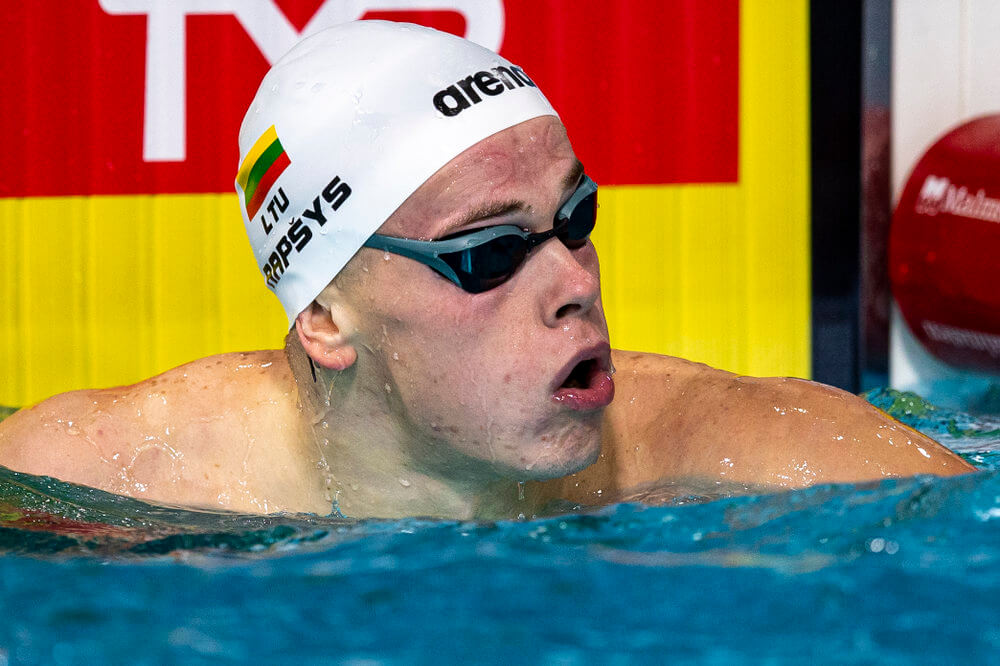
European Short-Course Championships
Glasgow, Day 2 Finals and Semi-Finals
Danas Rapsys dug deep into his reserves and produced a late surge to claim the 200m freestyle title to add to his 400m gold on the second night of finals at the European Short-Course Swimming Championships in Glasgow.
Russia‘s mixed 4x50m medley relay quartet set a new world record as they claimed gold in 1:36.22, cutting 0.18secs from the mark set by the United States at last year’s World Short-Course Championships in Guangzhou, China.
There was also a championship record for Melanie Henique in the 50m butterfly as she led home a French one-two in 24.56 to cut 0.02secs from Sarah Sjostrom’s mark set in Netanya, Israel, in 2015.
The Lithuanian Rapsys had scorched to victory in the longer race on the opening night in a new championship record and on Thursday he added the 200 freestyle in 1:41.12.
Duncan Scott – who had shattered the British record in the heats as he lowered James Guy’s 2016 mark to 1:40.92 – was second in 1:41.42 with Mikhail Vekovishchev of Russia third in 1:41.52 as Guy was locked out.
Scott led at the 150m mark with Rapsys leading a late attack after his efforts in the 400m had taken its toll.
Rapsys said: “I had no special strategy, how to start, how to go at the end because I felt tired after the 400m free yesterday. I had to dig into my reserves for the last 50m. I focused only on myself, I didn’t really see or care of the others.”
The 24-year-old, who won long-course silver behind Scott in the same pool at the 2018 European Championships, was world champion for a split-second in Gwangju, South Korea in July.
However, a twitch on the blocks led to his disqualification and elevation to gold and bronze for Sun Yang and Scott respectively and the subsequent podium protest, boos and recriminations.
For Rapsys though, there was no lasting psychological effect of having been momentarily on top of the podium.
He told Swimming World:
“No, what happens it happens. I just forgot it and looked forward. I just left everything that happened and just (look to) swim faster than last time.”
Next up for the Lithuanian is the 200IM and a reunion with Scott before the 100IM and a dabble in the 200m butterfly.
“Just to try out (to see) what I can do,” he said. “I want to try another event.”
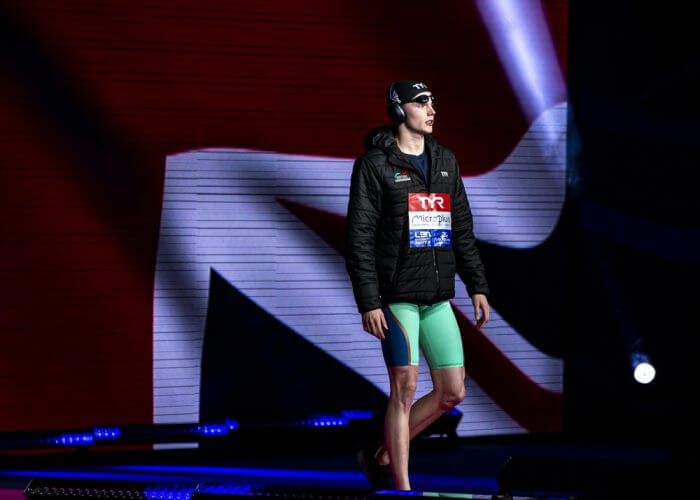
Photo Courtesy:
Scott said: “It was good, the second fastest I’ve ever been. The back end wasn’t quite as good as this morning but it was alright, not that far off what I went this morning. It was a good three races today: high-intensity and I learned quite a bit so it was good.”
The 22-year-old had also led the way in the 400IM in the heats – although he did not appear for the final this evening which was won by fellow Briton Max Litchfield.
Scott explained to Swimming World after the heats that the plan was to swim prelims as fast as possible and perform while fatigued with eyes on Tokyo 2020 where the finals will be held in the morning.
For the University of Stirling athlete it was mission accomplished in terms of going all out in the morning.
“I am here to focus on the heats, I am trying to swim as fast as I can in the heats. I would like to think I wouldn’t maybe have gone 1:40 this morning if I was looking to try and focus on tonight and I maybe wouldn’t have done the 400IM.
“I guess there is a little bit in me that is like well I think you would have won but if that is the situation I am now in it’s a good position to be in for later competitions to know that if I swim my best time or around my best time I am going to be in with a shot of a medal.”
He added: “It’s not that I am not focusing on finals because it’s a European final. It’s just that I am trying to get the best out of myself in mornings and trying to come back at night under a lot of fatigue to try and perform as fast as I did in the morning.
“It is different but it is something we have worked at and looked at and something most athletes here are going to have to do for next year.”
Scott was initially slated to swim in the mixed medley relay but some cramp in his left leg led to him pulling out to be replaced by Scott McLay as Great Britain finished seventh.
Championship Quick Links:
- Entries, start lists, results and medals tables in full
- Live Streaming
- Our Championship Coverage On One Page
- Duncan Scott Smashes British Record With 4th Best Textile 200 Free Ever In Glasgow Heats
Mixed 4x50m Medley Relay
A Russian quartet of Kliment Kolesnikov, Vladimir Morozov, Arina Surkova and Maria Kameneva became the new world-record holders.
Led out by Kolesnikov in 22.67 – the fastest backstroke split in the entire field – the Russian squad led for the whole race with the Netherlands and Denmark rounding out the podium.
Morozov said: “We have a team with the best specialists in each stroke. Still, you never know what can happen in this type of race – though today everything has happened as planned.”
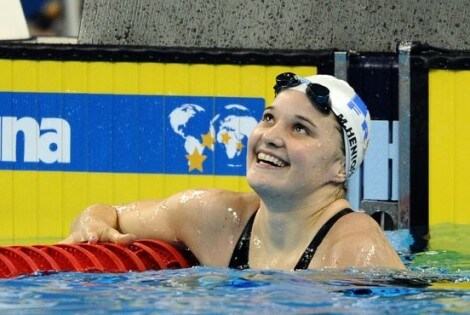
Melanie Henrique – Photo Courtesy: Speedo
Women’s 50m Butterfly
Henique claimed her first international individual title ahead of team-mate Beryl Gastaldello who clocked 24.78 with Emilie Beckmann and Jeanette Ottesen sharing a Danish double in third in 25.15.
Henique rose first and her lead was never threatened and before dashing to the mixed medley relay in which France were fifth, she said: “Just one word: amazing!”
Women’s 800m Freestyle
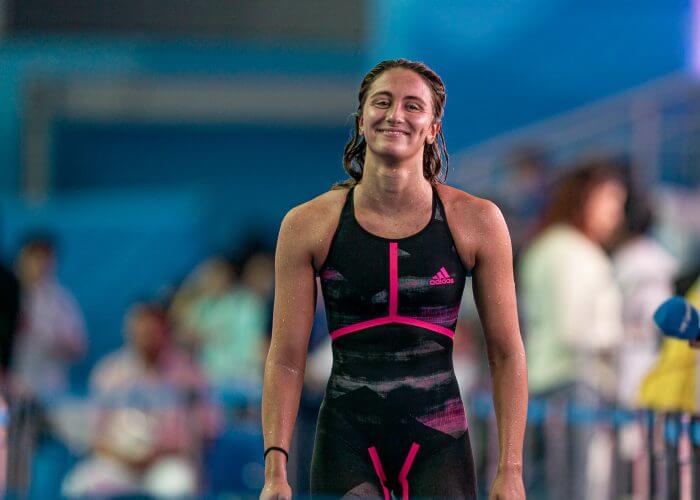
Simone Quadarella Photo Courtesy: Becca Wyant
Simona Quadarella led from start to finish to claim her first international title in 8:10.30 ahead of Ajna Kesely and Martina Caramignoli.
The Italian was accompanied by Kesely and Caramignoli for the first 300m when she started pulling away and she had a body-length lead at the halfway point.
The Hungarian attempted to make inroads but it was really a battle for the minor medals involving Kesely, Carmignoli and Julia Hassler of Liechtenstein.
While Quadarella was in control, a battle royal was unfolding behind her and one that Kesely grasped on the final turn to take silver in 8:11.77 with Caramignoli the second Italian on the podium in 8:12.36.
Quadarella, who won the 400-800-1500m triple at last year’s long-course Europeans, said: “I wanted to improve my time but at the end I’m happy with the gold medal. I confirmed my status as European champion. This is was not the specific race I prepared for, still, I could have swum it a bit better. It’s all about the preparations to the Olympics.”
For Kesely though there was the hint of mixed feelings as she said:
“I wouldn’t say I wish to any of my enemies the feeling when you recognise that you miscalculated the laps. Sometimes it happens to me in short-course…Otherwise, it was good to stay that close to Simona so I’m curious to see how the 400m free will unfold.”
Men’s 100m Butterfly
Marius Kusch led from start to finish to claim gold for Germany in 49.06 ahead of Vekovishchev, the Russian claiming his second medal of the night in 49.53.
Marcin Cieslak of Poland was third in 49.75.
Women’s 100m Backstroke
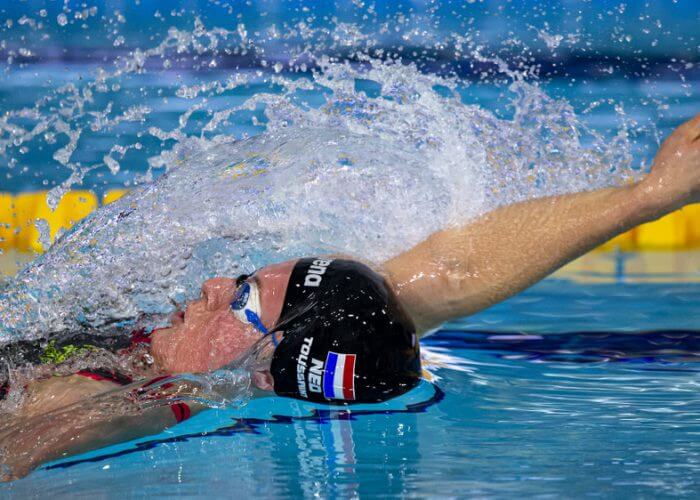
Kira Toussaint – Photo Courtesy: Patrick B. Kraemer
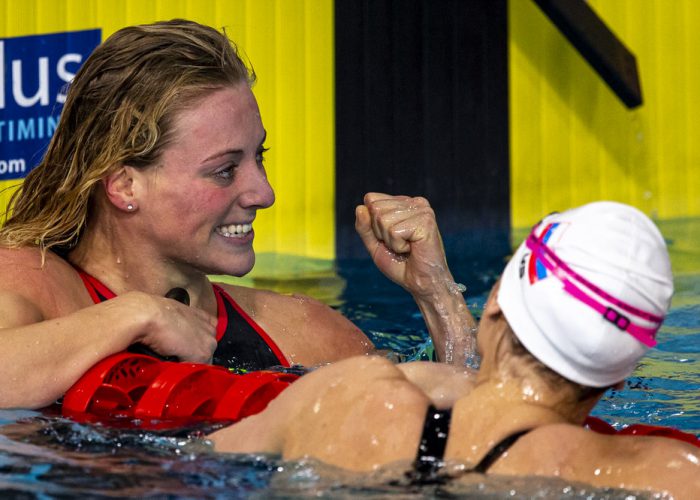
Kira Toussaint – Photo Courtesy: Patrick B. Kraemer
Kira Toussaint held off a fast-finishing Maria Kemeneva to win her first individual title in 55.71secs, the Russian second in 56.10 and Britain’s Georgia Davies third in 56.73.
Toussaint was 0.13 inside Katinka Hosszu’s European record pace at halfway and appeared on the brink of at least setting her third championship mark of the competition.
While she did not do this, it mattered little to the 25-year-old who said:
“At the end I won an individual gold medal at a major championship! The plan was to achieve fast times yesterday and today the gold was in the focus. Considering where I was last year, it’s crazy to achieve all this.”
Men’s 400m Individual Medley
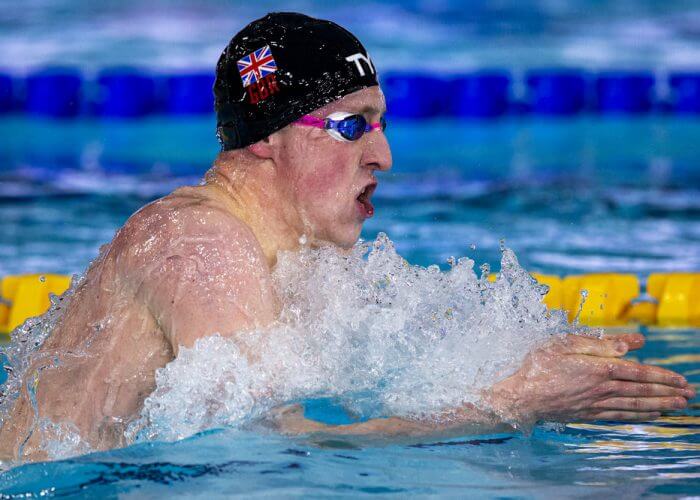
Max Litchfield – Photo Courtesy: Patrick B. Kraemer
Duncan Scott had been the fastest in the morning heats but withdrew leaving Litchfield to carry home hopes which he did in some style by claiming his first international title.
Ahead after the butterfly and backstroke legs, the Loughborough swimmer found his lead being eaten into by 16-year-old Ilia Borodin on breaststroke.
Litchfield dug in and extended his advantage to claim gold in 4:01.36 ahead of Russian Borodin whose time of 4:03.65 was announced as a European junior record. Daniil Pasynkov of Russia took bronze.
Litchfield said: “I would have liked to have been a bit quicker but to get the win in front of a home crowd is great. It feels weird being here in December and racing internationally. You don’t often do that. But it’s nice to be able to show your competitive nature and swim for GB.
“It’s good experience. I’ve been around a while now and I’m one of the senior members of the team but you can never lose anything by competing, just getting in there and going up against the best in Europe.”
On Scott’s withdrawal, he added: “It’s disappointing he pulled out because it would have been a great race. But we’ve both got our own individual programmes.”
Men’s 200m Breaststroke
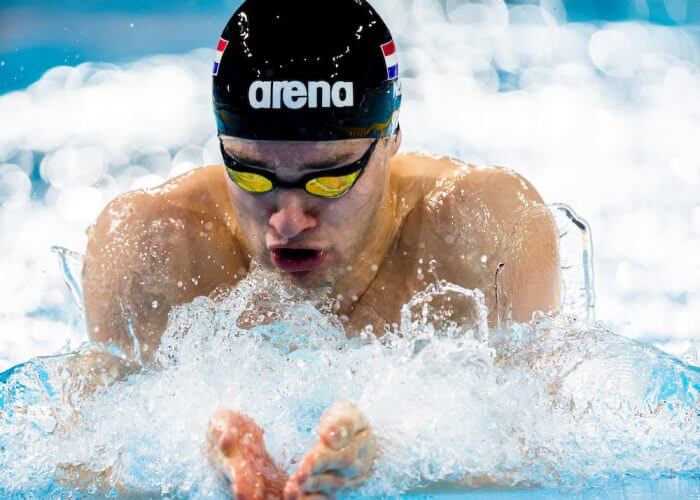
Arno Kamminga; Photo Courtesy: Foto Giorgio Scala / Deepbluemedia /Insidefoto
Arno Kamminga of the Netherlands added gold to his 50m bronze as he came from fifth at the 150m mark to win in 2:02.36 ahead of Erik Persson of Sweden (2:02.80) and Marco Koch (2:02.87).
Kamminga said: “Amazing, it was so close! It feels so good to be on top. Yesterday I won my first European medal and today I claimed my first gold so it’s been an incredible two days. Though I’m a bit tired, this was my sixth race in two days, I’m waiting to have some calmer moments now.”
Persson added: “It’s my first time on the podium so I’m so happy. I felt good this morning and I thought it was possible to get a medal here.”
However, it was in sharp contrast to Koch, the 2017 silver medallist, who said: “I’m totally exhausted, it was not a good race, I’m not happy at all.”
In the semi-finals, Freya Anderson of Great Britain progressed quickest into tomorrow’s 100m free final in 51.95 ahead of Denmark’s 50m Olympic champion Pernille Blume (52.18) and Femke Heemskerk of the Netherlands (52.22).
Kolesnikov heads the 100m backstroke field in 49.57 – and that without a great touch – ahead of Christian Diener (50.08) and Robert Glinta in 50.13.
Hosszu heads the 100IM in 58.35 ahead of Britain’s Siobhan O’Connor (58.53) and Kameneva (58.84).




